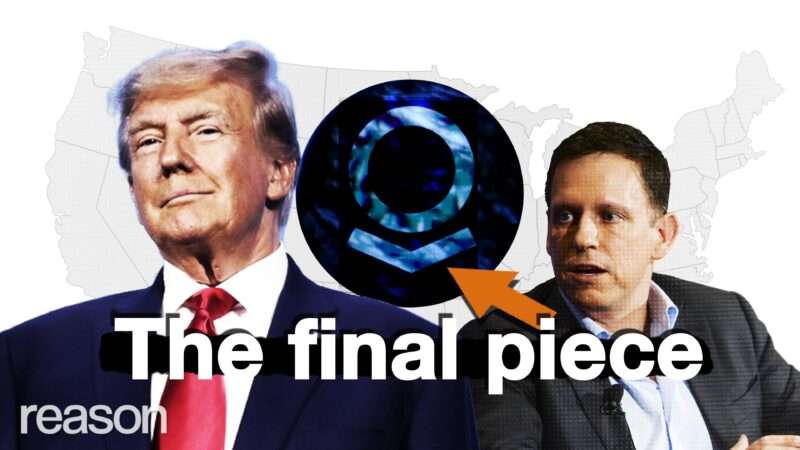Donald Trump and Peter Thiel Are Using AI To Supercharge the Surveillance State
Description
<source type="image/webp" />
<source type="image/jpeg" />

Peter Thiel, the billionaire venture capitalist and PayPal co-founder, has a provocative theory about how the Antichrist could take over the Earth and enslave humanity.
"My speculative thesis is that if the Antichrist were to come to power it would be by talking about Armageddon all the time," Thiel told Hoover Institution interviewer Peter Robinson earlier this year.
The greatest danger we face, according to Thiel, might not be from global warming, terrorism, nuclear winter, or artificial intelligence going rogue. The real danger is that we're so afraid of these threats that we're willing to give up our freedom in the interest of "peace and safety," which is the phrase Thiel ascribed to the Antichrist, citing Thessalonians 5:3.
"It's the opposite of the picture of Baconian science from the 17th, 18th century, where the Antichrist is like some evil tech genius, evil scientist who invents this machine to take over the world," Thiel told the New York Times' Ross Douthat on a podcast. "In our world, it's far more likely to be Greta Thunberg."
"I feel like that Antichrist would maybe be using the tools that you are building," replied Douthat.
Douthat was referring to Palantir, the government contractor that Thiel co-founded in 2003 during the height of the war on terror. Today, Palantir is "in the white-hot center of the latest trend reshaping the global order," according to The Wall Street Journal, receiving more than $322 million from government contracts in the first half of 2025.
It's equipping the government with tools to sift through massive data troves to identify patterns and hunt down illegal immigrants. It's helping the Feds deploy facial recognition technology, and has created AI tools to "predict" where crimes might happen in advance.
"Like, wouldn't the Antichrist be like: Great, we're not going to have any more technological progress, but I really like what Palantir has done so far," Douthat asked Thiel. "Isn't that a concern? Wouldn't that be the irony of history, that the man publicly worrying about the Antichrist accidentally hastens his or her arrival?"
When Thiel replied that hastening the Antichrist's arrival is "obviously" not what he thinks he's doing, Douthat agreed that it was unlikely but pressed, "I'm just interested in how you get to a world willing to submit to permanent authoritarian rule."
It's a great question. While Peter Thiel is warning that the Antichrist could bring totalitarianism by exploiting our desire for "peace and safety," a company that he co-founded is building the tools with great potential for abuse by a totalitarian surveillance state, all based on our desire for "peace and safety."
Is it too late to stop this nightmare?
It's fitting that Palantir is named after the mythical stones in J.R.R. Tolkien's Lord of the Rings, which allow users to see into distant lands, eavesdrop on conversations, peer into the past, and—some claim—conjure visions of the future. Tolkien, a devout Catholic, explored the dangers of unbridled power in a way that resonates with Thiel's ideas about the Antichrist.
While the Antichrist invokes peace and safety, the corrupted wizard Saruman in Lord of the Rings implores his fellow wizard Gandalf to join forces with the dark entity Sauron, he invokes the values of "Knowledge, Rule, Order."
Trump promised peace and safety when he took the stage to accept the Republican nomination in 2016 by cracking down on crime and riots in America's big cities.
"I have a message for all of you: the crime and violence that afflicts our nation will soon come to an end. Beginning on January 20th 2017, safety will be restored."
Thiel, who was the first tech billionaire to back Trump, spoke at that convention.
Eight years later, Trump was back at the RNC once again warning of a crisis and promising to restore peace and safety.
"There's never been an invasion like this anywhere," said Trump, referring to a spike in illegal immigration.
Exploiting a national emergency, real or manufactured, is how governments typically grow their power and limit our freedoms. As the libertarian economic historian Robert Higgs chronicled in his 1987 classic, Crisis and Leviathan, the government ratcheted up its power in the 20th century by capitalizing on the Great Depression and two world wars.
More recently, the 9/11 terrorist attacks justified the war in Afghanistan, provided cover for the invasion of Iraq, and led to the expansion of the surveillance state under a new paradigm known as Total Information Awareness.
"[Total Information Awareness was] what Palantir is now. What they were literally trying to do is come up with the ability to ingest data from pretty much any source and then run that against their de facto target list," says Patrick Eddington, a former CIA analyst who studies the surveillance state at the libertarian Cato Institute. His latest book is The Triumph of Fear, a history of federal law enforcement and surveillance.
"All this stuff at the end of the day is fear-based. That's how we get a lot this surveillance mentality," says Eddington.
Total Information Awareness was an initiative started at DARPA, the research arm of the Defense Department. The stated goal was to construct a "virtual, centralized, grand database" for tracking terrorists, the same kind of database Trump wants to build to track illegal immigrants.
The government hit years of roadblocks before finally achieving this vision. Public backlash to the unnerving name led to a rebranding before Congress defunded the program in 2003.
"But a lot of these really bad surveillance-related ideas, even if they get knocked down, they're kind of like a vampire, right? You knock them down. You think you've knocked them down for good, and then one way or the other, they just seem to kind of come back," says Eddington.
Total Information Awareness <a href="https://web.archive.org/web/20110





